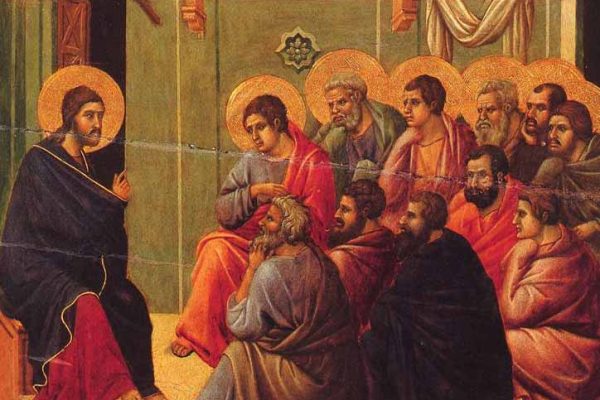Home>Bible Facts>When Did Jesus Disciples Become Apostles


Bible Facts
When Did Jesus Disciples Become Apostles
Published: February 18, 2024
Peter Smith, Editorial Director at Christian.net, combines deep insights into faith, politics, and culture to lead content creation that resonates widely. Awarded for his contributions to religious discourse, he previously headed a major organization for religious communicators, enhancing dialogue on faith's societal impacts.
Discover the transformation of Jesus' disciples into apostles and explore fascinating Bible facts about this significant transition. Uncover the historical and spiritual significance of this pivotal moment in Christian history.
(Many of the links in this article redirect to a specific reviewed product. Your purchase of these products through affiliate links helps to generate commission for Christian.net, at no extra cost. Learn more)
Table of Contents
Introduction
The journey of Jesus Christ and his disciples is a compelling narrative that has left an indelible mark on the course of human history. The transition of Jesus' disciples into apostles is a pivotal aspect of this profound story, signifying a transformative shift in their roles and responsibilities. This transition holds significant theological and historical implications, shedding light on the evolution of early Christianity and the enduring impact of the apostles' teachings.
The term "disciple" originates from the Latin word "discipulus," meaning a learner or a follower. In the context of Jesus' ministry, the disciples were individuals who devoted themselves to following and learning from him. They were witnesses to his teachings, miracles, and the profound wisdom he imparted. Their journey with Jesus was characterized by a deep sense of commitment and a profound desire to understand and embody his teachings.
On the other hand, the term "apostle" stems from the Greek word "apóstolos," signifying a messenger or one who is sent forth. The transition from disciple to apostle marked a significant shift in the disciples' roles. It denoted a commissioning, empowering them to go forth and spread the teachings of Jesus to the world. This transformation was not merely semantic; it represented a profound elevation of their purpose and mission.
The transition from disciples to apostles was not merely a change in title; it represented a profound shift in their responsibilities and authority. As apostles, they were entrusted with the crucial task of carrying forward the message of Jesus, establishing and nurturing Christian communities, and serving as ambassadors of the faith. This transition marked a pivotal moment in the history of Christianity, shaping the trajectory of the early church and laying the foundation for its enduring legacy.
The journey from discipleship to apostleship holds immense significance, serving as a testament to the enduring impact of Jesus' teachings and the unwavering dedication of his followers. It is a narrative that continues to inspire and resonate across generations, underscoring the profound transformation that took place within the hearts and lives of those who walked alongside Jesus. As we delve into the meaning of discipleship and apostleship, we unravel a rich tapestry of faith, commitment, and the enduring legacy of those who were called to carry forth the message of hope and redemption.
The Meaning of "Disciple" and "Apostle"
The terms "disciple" and "apostle" hold profound significance in the context of Jesus Christ's ministry and the early Christian movement. Understanding the nuanced meanings of these terms provides insight into the roles and transitions experienced by Jesus' followers.
Disciple:
The term "disciple" originates from the Latin word "discipulus," which translates to "learner" or "follower." In the context of Jesus' ministry, disciples were individuals who dedicated themselves to following and learning from him. They were not merely passive observers but active participants in the journey alongside their revered teacher. The disciples' commitment was characterized by a deep desire to understand and internalize the profound teachings and principles imparted by Jesus. Their role extended beyond mere followership; they were entrusted with the responsibility of embodying and perpetuating the transformative message of their master.
Apostle:
On the other hand, the term "apostle" derives from the Greek word "apóstolos," signifying a "messenger" or "one who is sent forth." The transition from disciple to apostle marked a significant shift in the followers' roles. It denoted a commissioning, empowering them to go forth and spread the teachings of Jesus to the world. This transformation was not merely semantic; it represented a profound elevation of their purpose and mission. As apostles, they were no longer solely recipients of wisdom and guidance; they became bearers of the sacred message, entrusted with the monumental task of propagating the transformative teachings of Jesus to diverse corners of the world.
The distinction between disciples and apostles encapsulates a profound evolution in the followers' roles, from dedicated learners to empowered messengers. This transition underscores the transformative impact of Jesus' teachings and the profound trust placed in his followers to carry forth the torch of enlightenment and salvation.
This understanding of the meanings of "disciple" and "apostle" sets the stage for delving into the transition from discipleship to apostleship and the enduring impact of this transformation on the early Christian movement.
The Transition from Disciple to Apostle
The transition from being a disciple to an apostle marked a profound shift in the roles and responsibilities of Jesus' followers. It signified a transformative evolution from dedicated learners to empowered messengers and leaders within the burgeoning Christian movement. This transition was not merely a change in title; it represented a pivotal moment in the history of Christianity, shaping the trajectory of the early church and laying the foundation for its enduring legacy.
As disciples, the followers of Jesus were deeply committed to learning from their revered teacher, internalizing his teachings, and bearing witness to his transformative ministry. They walked alongside Jesus, imbibing his wisdom and embodying the principles he espoused. However, the transition to apostleship signaled a significant elevation of their purpose and mission. It denoted a commissioning, empowering them to go forth and spread the teachings of Jesus to the world.
The transition from disciple to apostle was not a mere formality; it represented a profound empowerment and entrustment. The disciples, who had been profoundly impacted by the teachings and ministry of Jesus, were now called to become active agents of spreading the message of hope, redemption, and salvation. This transition marked a pivotal moment in their journey, as they were entrusted with the crucial task of carrying forward the message of Jesus, establishing and nurturing Christian communities, and serving as ambassadors of the faith.
The transition from discipleship to apostleship was accompanied by a profound sense of empowerment and responsibility. It required the apostles to step into leadership roles, guiding and shepherding the early Christian communities that began to take root. They were no longer mere followers; they became instrumental in shaping the nascent Christian movement, imparting wisdom, and providing spiritual guidance to those who sought to embrace the teachings of Jesus.
This transition from disciples to apostles underscores the transformative impact of Jesus' ministry and the unwavering commitment of his followers to perpetuate his message. It represents a pivotal juncture in the history of Christianity, signifying the emergence of empowered leaders who would shape the course of the faith and leave an indelible mark on the world.
The transition from discipleship to apostleship serves as a testament to the enduring impact of Jesus' teachings and the profound transformation that took place within the hearts and lives of those who walked alongside him. It is a narrative that continues to inspire and resonate across generations, underscoring the profound evolution of purpose and mission that defined the transition from disciple to apostle.
Read more: When Did Jesus Appear To The Apostles
The Role and Responsibilities of the Apostles
The apostles, following their transition from discipleship, assumed pivotal roles and profound responsibilities within the early Christian movement. Their newfound status as apostles empowered them to undertake significant tasks that would shape the trajectory of Christianity and leave an enduring impact on the world.
Spiritual Leadership and Guidance
As apostles, these revered individuals assumed the mantle of spiritual leadership and guidance within the burgeoning Christian communities. They were entrusted with the responsibility of imparting wisdom, providing pastoral care, and nurturing the spiritual growth of those who embraced the teachings of Jesus. Their role extended beyond mere instruction; they served as beacons of faith, offering unwavering support and guidance to the early believers as they navigated the challenges and triumphs of their newfound faith.
Establishment of Christian Communities
The apostles played a pivotal role in the establishment and consolidation of Christian communities. They traveled extensively, spreading the message of Jesus and laying the foundations for communities of believers. Their efforts were instrumental in fostering a sense of unity and fellowship among the early Christians, creating spaces where individuals could gather to worship, learn, and support one another in their shared faith.
Proclamation of the Gospel
Central to the role of the apostles was the proclamation of the Gospel – the transformative message of salvation and redemption through Jesus Christ. They fearlessly shared this message, often in the face of adversity and persecution, demonstrating unwavering dedication to spreading the profound teachings of their revered teacher. Their proclamation of the Gospel served as a catalyst for the expansion of the Christian faith, reaching diverse audiences and inspiring countless individuals to embrace the message of hope and grace.
Read more: When Did Augustine Become A Saint
Witness to the Resurrection
The apostles bore witness to the resurrection of Jesus Christ, an event that solidified the foundation of the Christian faith. Their testimony to this pivotal moment in history served as a cornerstone of their role, affirming the reality of the resurrection and its profound significance for humanity. Their unwavering conviction in the resurrection fueled their mission, inspiring others to embrace the transformative power of this foundational belief.
Enduring Legacy
The role and responsibilities should be concluded by emphasizing the enduring legacy of the apostles, highlighting their profound impact on the early Christian movement and the enduring relevance of their teachings and example.
The apostles' roles and responsibilities encompassed a multifaceted and profound commitment to nurturing, guiding, and proclaiming the transformative message of Jesus Christ. Their unwavering dedication and leadership laid the groundwork for the enduring legacy of the Christian faith, shaping the course of history and inspiring generations to embrace the profound teachings they espoused.
The Impact of the Apostles in Early Christianity
The apostles wielded a profound and enduring impact on the landscape of early Christianity, shaping its trajectory and laying the foundation for its enduring legacy. Their unwavering commitment, leadership, and proclamation of the transformative message of Jesus Christ reverberated across diverse communities, leaving an indelible mark on the burgeoning Christian movement.
The apostles' role as spiritual leaders and guides was instrumental in nurturing the fledgling Christian communities that emerged in the wake of Jesus' ministry. Their steadfast dedication to imparting wisdom, providing pastoral care, and fostering a sense of unity and fellowship among believers created a framework for communal worship, mutual support, and spiritual growth. This nurturing environment served as a crucible for the development and consolidation of the early Christian faith, fostering a sense of belonging and shared purpose among its adherents.
Furthermore, the apostles' tireless efforts in proclaiming the Gospel catalyzed the expansion of the Christian faith, reaching diverse audiences and inspiring countless individuals to embrace the message of hope and grace. Their fearless advocacy for the transformative teachings of Jesus Christ transcended geographical and cultural boundaries, resonating with individuals from varied backgrounds and societal strata. This widespread dissemination of the Gospel laid the groundwork for the enduring global impact of Christianity, shaping the spiritual landscape of countless nations and cultures.
The apostles' witness to the resurrection of Jesus Christ served as a cornerstone of their mission, affirming the reality of this pivotal event and its profound significance for humanity. Their unwavering conviction in the resurrection fueled their proclamation of the Gospel, inspiring others to embrace the transformative power of this foundational belief. The apostles' testimony to the resurrection resonated deeply with early believers, instilling a steadfast faith in the redemptive power of Christ's triumph over death.
The enduring legacy of the apostles is evident in the enduring relevance of their teachings and example. Their profound impact on the early Christian movement transcends the boundaries of time and space, continuing to inspire and guide believers across generations. The apostles' unwavering commitment to spreading the message of Jesus Christ laid the groundwork for the enduring legacy of the Christian faith, shaping the course of history and inspiring countless individuals to embrace the profound teachings they espoused.
The impact of the apostles in early Christianity stands as a testament to their unwavering dedication, profound leadership, and enduring influence on the spiritual landscape of the world. Their legacy continues to resonate, underscoring the transformative power of their mission and the enduring relevance of the message they fervently proclaimed.
Conclusion
The transition of Jesus' disciples into apostles marked a profound evolution in their roles and responsibilities, signifying a transformative shift from dedicated learners to empowered messengers and leaders within the burgeoning Christian movement. This transition was not merely a change in title; it represented a pivotal moment in the history of Christianity, shaping the trajectory of the early church and laying the foundation for its enduring legacy.
The journey from discipleship to apostleship encapsulates the enduring impact of Jesus' teachings and the unwavering commitment of his followers to perpetuate his message. It represents a pivotal juncture in the history of Christianity, signifying the emergence of empowered leaders who would shape the course of the faith and leave an indelible mark on the world.
The apostles, following their transition from discipleship, assumed pivotal roles and profound responsibilities within the early Christian movement. Their newfound status as apostles empowered them to undertake significant tasks that would shape the trajectory of Christianity and leave an enduring impact on the world. They served as spiritual leaders, nurturers of Christian communities, fearless proclaimers of the Gospel, and witnesses to the resurrection of Jesus Christ. Their unwavering dedication and leadership laid the groundwork for the enduring legacy of the Christian faith, shaping the course of history and inspiring generations to embrace the profound teachings they espoused.
The impact of the apostles in early Christianity stands as a testament to their unwavering dedication, profound leadership, and enduring influence on the spiritual landscape of the world. Their legacy continues to resonate, underscoring the transformative power of their mission and the enduring relevance of the message they fervently proclaimed.
In conclusion, the transition from disciples to apostles represents a profound testament to the enduring impact of Jesus' teachings and the unwavering commitment of his followers. It signifies the emergence of empowered leaders who would shape the course of the faith and leave an indelible mark on the world. The apostles' unwavering dedication and leadership laid the groundwork for the enduring legacy of the Christian faith, shaping the course of history and inspiring countless individuals to embrace the profound teachings they espoused.













